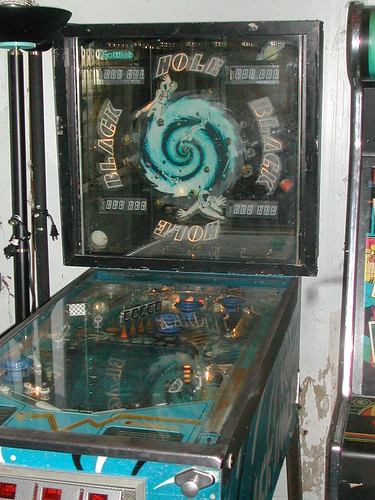| inane babble |
|---|
|
maintenance log moved to wiki
|
| links |
|
Clay's System 80
Guide
IPDB entry (old IPD) Stork's Nest System 80 site and Black Hole serial numbers |

|
| The game didn't look so bad once I figured out how to put the backglass in. |
I have a neglected Black Hole and am working on fixing its issues. It has been neglected by others, and neglected by me for about 2.5 years. It powers up and plays and at this point all of the critical playfield features are working. There's a lot left to do (see my maintenance log). Newer pictures are on Flickr, but there aren't many of them.
At this point, fold-down heads and the Williams playfield pull-out-and-pivot mechanisms seem like absolute miracles.
Think it's not challenging enough to work on Williams games? Is it too easy to check transistors on the driver board? Get a Gottlieb System 80 game. 16 transistors and wires driving 64 lamps? Bah! My Black Hole has 50 transistors and wires for its 50+ lamps! Plus some of those are secretly coil pre-drivers. Sick of silly auxilary boards for those extra drivers? Luxury! System 80 games just have big metal-case transistors under the playfield. Find it too simple to have diagnostics that test all the coils at once? No problem. Black Hole tests six of the coils (numbers 1, 2, 5, 6, 8, and 9, of course) in the solenoid test, then repeatedly fires the rest in the lamp test because secretly the lower playfield upkicker is a LAMP.

|
| front view on a bad day |
Actually, to be fair, a big part of the problem is the advances in software between High Speed and Black Hole. I am very spoiled by things like Williams' notification of switches that haven't triggered, for instance.

|
| head serial number |
What I find inexcusable about the electronics on this game is that Gottlieb went from 5 actual solenoids on their System 1 games (like Cleopatra) to 6 on their System 80 games. (System 1 games technically have 8, but three of those have to be used for sound; System 80 games technically have 9, but three are usually reserved for never-installed coin counters.) In both systems, some lamp transistors are usually drafted into coil service by adding a transistor under the playfield. They should have just gone to 12 or so transistors on the boards.
It appears in both systems that lamp-driving-coil transistors are pulsed as part of the "lamp" self-test. I find it surprising that the programmers on Gottlieb games couldn't have time to do this correctly. But, then, I haven't actually worked on Williams games of similar vintage, so I'm not entirely sure that I'm right.